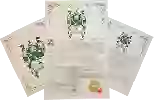
Château ClématisExcellence
In the mouth this red wine is a powerful with a nice balance between acidity and tannins.
This wine generally goes well with beef, game (deer, venison) or lamb.
Taste structure of the Excellence from the Château Clématis
Light | Bold | |
Smooth | Tannic | |
Dry | Sweet | |
Soft | Acidic |
In the mouth the Excellence of Château Clématis in the region of Rhone Valley is a powerful with a nice balance between acidity and tannins.
Food and wine pairings with Excellence
Pairings that work perfectly with Excellence
Original food and wine pairings with Excellence
The Excellence of Château Clématis matches generally quite well with dishes of beef, lamb or game (deer, venison) such as recipes of fondue vigneronne au vin rouge, lamb with vermicelli or rabbit italian style.
Details and technical informations about Château Clématis's Excellence.
Discover the grape variety: Mondeuse
Mondeuse noir is a grape variety that originated in France (Savoie). It produces a variety of grape specially used for wine making. It is rare to find this grape to eat on our tables. This variety of grape is characterized by medium to large bunches, and grapes of medium size. Mondeuse noir can be found in many vineyards: South-West, Cognac, Bordeaux, Savoie & Bugey, Languedoc & Roussillon, Loire Valley, Provence & Corsica, Rhône Valley, Beaujolais.
Informations about the Château Clématis
The Château Clématis is one of of the world's greatest estates. It offers 6 wines for sale in the of Côtes-du-Rhône to come and discover on site or to buy online.
The wine region of Côtes-du-Rhône
The wine region of Côtes-du-Rhône is located in the region of Rhône méridional of Rhone Valley of France. Wineries and vineyards like the Château de Beaucastel or the Chateau de Fonsalette produce mainly wines red, white and pink. The most planted grape varieties in the region of Côtes-du-Rhône are Mourvèdre, Viognier and Marsanne, they are then used in wines in blends or as a single variety. On the nose of Côtes-du-Rhône often reveals types of flavors of pineapple, red plum or sour cherry and sometimes also flavors of truffle, juniper or clove.
The wine region of Rhone Valley
The Rhone Valley is a key wine-producing region in Southeastern France. It follows the North-south course of the Rhône for nearly 240 km, from Lyon to the Rhône delta (Bouches-du-Rhône), near the Mediterranean coast. The Length of the valley means that Rhône wines are the product of a wide variety of soil types and mesoclimates. The viticultural areas of the region cover such a distance that there is a widely accepted division between its northern and southern parts.
The word of the wine: Vine
Climbing shrubs with woody stems called shoots that produce grapes in clusters.














